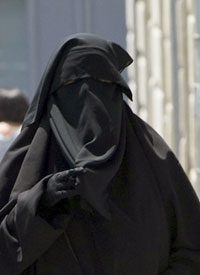
To cries of outrage from the American Civil Liberties Union (ACLU) and the Michigan branch of the Council on American-Islamic Relations, the Michigan Supreme Court has issued a ruling allowing state courts to “exercise reasonable control” over the appearance of individuals summoned before the court. The ruling has sparked such an outcry because the matter which is at issue is the power of judges to regulate the wearing of the veil — common among Moslem women — while they are testifying in a court of law.
According to a CNN report, “The order allows courts ‘reasonable control over the appearance of parties and witnesses’ so as to ‘ensure that the demeanor of such persons may be observed and assessed by the fact-finder and ensure the accurate identification of such person.’ " The ruling was prompted by the controversy surrounding a 2006 case in which Judge Paul Paruk required Ginnah Muhammad to remove her niqab (a garment which covers all of the head except for the eyes). As CNN quotes Judge Paruk: "I can’t see certain things about your demeanor and temperament that I need to see in a court of law." Muhammad refused, and her case was dismissed, at which point she appealed to the 6th Circuit Court of Appeals.
While both the ACLU and CAIR of Michigan have attempted to package the incident as a conflict over Muhammad’s freedom of religion, security concerns surrounding the wearing of the burka have circulated since 2001— particularly when matters of personal identification are at issue.
In fact, there are Moslem scholars who maintain that neither the veil — nor the burka, for that matter — are required by the tenets of Islam. In the words of a report by Al Arabiya published in the wake of the French scandal in June surrounding proposals to ban the wearing of the veil and burka: “Days after President Nicolas Sarkozy slammed the burka, or face veil, as ‘not welcome’ in France, Islamic scholars said the burka was not obligatory in Islam and said every state had a right to ban the face veil. The burka debate has been raging for a while in Europe with countries like the Netherlands banning it in universities and the British press reporting that Muslims and non-Muslims alike are calling for a ban on the face covering attire. As for the Islamic reaction Egypt’s Grand Imam, Sheikh Mohammad Tantawi, said the face veil was not compulsory in Islam and said every head of state had the right to accept or prohibit it.” If scholars from the center of the Islamic world maintain that their religion is not at stake in the wearing of the veil — and defend the right of states to even ban the veil — certainly Michigan, which, by most reports, is not a fundamentalist Islamic state, need not curtail reasonable courtroom procedures aimed at establishing the veracity of public testimony for the sake of personal apparel preferences.
— Photo: AP Images



